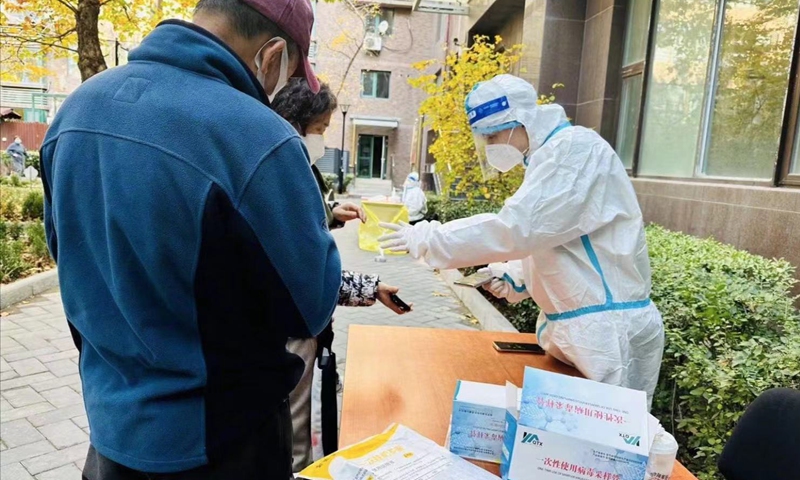Officials from Chinese National Health Commission said COVID-19 control measures should be lifted in a timely manner, and they vowed to seriously deal with excessive epidemic management measures at a press conference on Tuesday as various cities in China announced optimized policies to reduce the impact of epidemic on people’s life.
All regions across China have been making efforts to implement the prevention and control measures. A precise judgment for risk regions is needed, based on testing and epidemiological investigation, and anti-epidemic management should be lifted in a timely manner to minimize the inconvenience caused by the epidemic to people, said Mi Feng, spokesperson for the National Health Commission (NHC), on Tuesday.
The epidemic is developing rapidly across the country with a wide range of areas, with some places facing the most complex and severe situation in the three years since the beginning of the fight against COVID-19, Cheng Youquan, an official of the national administration of disease prevention and control, said at the press briefing.
The Chinese mainland on Monday reported 3,561 local confirmed COVID-19 cases and 34,860 local asymptomatic carriers, according to the NHC on Tuesday.
Cheng said that each of the 20 optimized measures is supported by sufficient scientific basis and evidence. The authorities have issued four guidelines that cover nucleic acid testing, risk regions’ classification and control, home quarantine for medical observation, and health monitoring at home to prevent risks, Cheng said. “As long as local governments strictly implement the related measures, we can effectively reduce the epidemic risk,” Cheng noted.
Jin Dongyan, a virologist and professor at the School of Biomedical Sciences at the University of Hong Kong, told the Global Times on Tuesday that these measures are optimized based on the characteristics of the main dominant COVID-19 strains. Jin said that the 20 optimized measures should be implemented fully in a more scientific and precise manner to combat the epidemic.
Mi also noted that all regions need to scientifically classify and treat COVID-19 patients and respond to the problems reported by people in a timely manner.
Some regions have arbitrarily expanded the scale of areas and people under COVID-19 prevention and control, and some places implemented control management for long periods and carried out static management without approval, according to Cheng.
The country has established special working groups to rectify these superfluous restrictions and responded to the problems reflected by people and shared these concerns with local authorities, according to Cheng.
Since the optimized 20 measures were announced on November 11, many places across China including Beijing, Guangzhou, Chongqing and Zhengzhou have further optimized their anti-COVID-19 measures, with some places allowing residents without social activities to be free from mass testing.
In South China’s Guangdong Province, Governor Wang Weizhong called for precise control and judging of risk regions in a scientific and rapid way, and supported COVID-19 close contacts, who are qualified with certain conditions, to be quarantined at home to minimize the impact of the epidemic on people’s lives, according to the Guangdong provincial government on Tuesday.
Some communities in Beijing also narrowed the scale of those who need to take part in screening in a precise approach, so that residents without social activities don’t need to take daily tests, according to media reports. An app for COVID-19 antigen tests was also put into operation with courses to guide people on how to do the tests themselves.
Some netizens have asked whether it is necessary for some elderly residents and cancer patients to be taken to makeshift hospitals after being infected. For those key groups with high risks that may progress into critical condition, classified treatment is needed to treat underlying diseases as well as to ensure patients’ safety and health, said the officials.
In Southwest China’s Chongqing Municipality, the city authorities established five special working groups to conduct an investigation over 16 third-party nucleic acid testing institutions to regulate the tests, as the city has reported more than 80,000 positive cases in the latest round of flare-ups.
There have been some problems reflected with nucleic acid testing recently. Guo Yanhong, an official from the NHC, said on Tuesday that there have been some illegal situations found in Beijing and other regions, and serious punishment has been imposed. Guo vowed to continue to strengthen supervision, and serious violations of the law involving issuing false nucleic acid test reports will be punished strictly in accordance with the law and regulations.
The joint prevention and control mechanism of the State Council on Tuesday issued a working plan to strengthen COVID-19 vaccination of the elderly, as a move to reduce the risk of severe or critical conditions and deaths. China plans to speed up the vaccination rate for people aged over 80 and continue to increase the rate for people aged between 60 and 79, according to the working plan.
It is very important to raise the vaccination rate among the elderly, Jin noted. It has been proved that the vaccines, particularly inactivated vaccines, under the related guidelines, are safe for even some elderly people with underlying diseases.
(Global Times)




